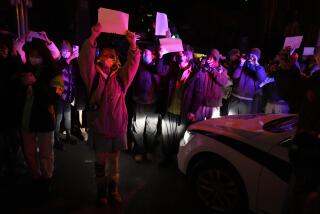China closes solar-panel plant after protests
Reporting from Beijing — Authorities ordered a solar-panel manufacturing plant in eastern China to close after four days of protests by hundreds of villagers who have accused the facility of causing air and water pollution, Chinese media reported Monday.
The decision is an indication of the growing power of environmental protesters to sway government policy in China. As many as 500 villagers participated in the protests near Haining, an industrial city of 640,000 in coastal Zhejiang province.
The plant’s operator, JinkoSolar, a New York Stock Exchange-listed company, issued a public apology Monday.
“We cannot shirk responsibility for the legal consequences which have come from management slips,” Jing Zhaohui, a company representative, said at a news conference. Calls to JinkoSolar Holding Co. went unanswered.
Since the beginning of the protests, 20 people have been arrested on charges of destruction of property, robbery and disturbing public order, the Haining government said in a news release Monday. Protesters damaged eight company cars and four police cars Friday after police attempted to forcibly disperse the crowd, according to the release.
Protesters had demanded an explanation for a large number of dead fish found last month in a nearby river. Tests by the local environmental protection bureau found that the plant was emitting high amounts of fluoride, which can be toxic if it exceeds certain levels. According to state media, the factory had been failing pollution tests since April.
“Since they set up their operations here, there has definitely been an impact on the villagers here.... This pollution is definitely harmful to us,” a local man told Reuters news service. State media also quoted villagers as complaining of harmful emissions from the factory’s dozen smokestacks.
In addition to the order to halt production lines emitting potentially harmful waste, the government has fined the plant about $74,000.
Chinese media have shown a surprising degree of boldness in reporting the incident. Reporters from a Zhejiang television station alleged that factory security guards attacked their production crew and destroyed a video camera. In response, the factory issued an on-air apology to the reporters and promised to fire the security guards, who it said were temporary employees.
The government has taken a characteristically firm stance on the use of Twitter-like microblogging services, which it fears as a potential engine of social unrest. Haining authorities detained one man on charges of “spreading false information” after he posted to his microblog that 31 people in Hengxiao, a village of 3,300 near the plant, have developed cancer within the last three years. City authorities say the number is exaggerated.
Other protests have prompted the government to take action in recent years. Last month, an estimated 12,000 people demonstrated outside a chemical plant in the northeastern coastal city of Dalian, expressing fears that typhoon weather would lead to dangerous chemical runoff. The protest led the city government to promise that it would close the plant.
In 2007, a similar incident in Xiamen, a southern coastal city, led authorities to relocate a chemical plant.
Scholars estimate that there are as many as 100,000 mass protests in China every year, many in rural areas. Most go unreported.
Kaiman is a special correspondent.
More to Read
Sign up for Essential California
The most important California stories and recommendations in your inbox every morning.
You may occasionally receive promotional content from the Los Angeles Times.










